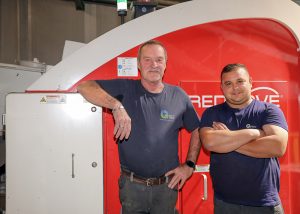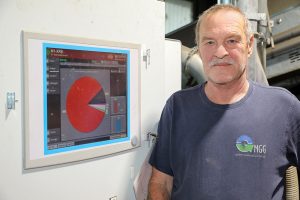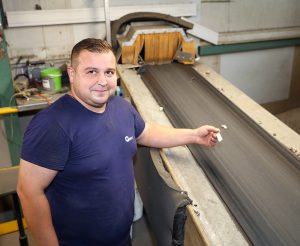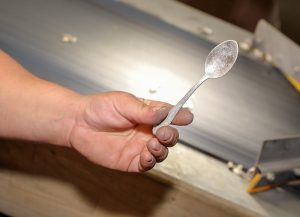It´s no secret that the Müller-Guttenbrunn Group has a shift work model. But what is behind it? How do the employees deal with the different working hours and does the much-cited work-life balance still work? Just in time for the shift change, we asked Gerhard Schartmüller and his colleague Claudiu Baciu for an interview to talk a bit about the situation.
It’s nice that you both found the time. To begin with, we would like to ask you to introduce yourselves for our readers…
Baciu: My name is Claudiu Baciu and I am 31 years old. I am originally from Arad in Romania, but I have been living in Amstetten for quite some time with my wife and our four-year-old child. I have been working at Metran for three years and I take care of the X-ray fluorescence system in Hall 1. My tasks include checking the material and maintaining the system.

Gerhard Schartmüller (left) and Claudio Baciu (right) in front of their „baby“, the REDWAVE X-ray fluorescence system.
Schartmüller: And I am Gerhard Schartmüller from Öhling and have been working for Metran since 2006. For 30 years I was employed by a construction company and paved roads, but my knees suffered a lot from this activity. As a result, one knee had to be surgically replaced and for me it was time to find a new job that was reasonable for my body. Coincidentally, my neighbor worked for the Müller-Guttenbrunn Group and he said at the time „Come on, introduce yourself. What could go wrong?“ No sooner said than done, and so I spent my first two MGG years at the COMBISENSE plant. As time went on, new areas of responsibility were added and as a result, I now know five different machines inside out. In addition, I work in Hall 8, and it doesn’t take long on a workday for my smartwatch to tell me that I’ve completed my daily goal of steps. Fortunately, all the movement doesn’t harm my knees, quite the opposite. I have to say that my joints are noticeably better. And here in Hall 1, I’m keeping things tidy at the REDWAVE X-ray fluorescence facility – also known as XRF – with my colleague Claudiu.
Mr. Schartmüller, your colleague’s shift is now over and you are continuing to work on the plant following the interview. Is there a shift change meeting, and what do you exchange information about?
Schartmüller: The top priority is, of course, to find out what material is being processed, so we know what needs to be done. Today, for example, precious metals are being sorted, which is why we have to monitor the plant and help sort by hand. It is also very important to exchange information about the performance of the machine. Did everything go according to plan, were there any malfunctions, or do various problems still need to be fixed? Some things we can fix on our own, such as general maintenance, clamping new rubber belts or lubricating the joints. In the case of electronic malfunctions, we call the electrician and if something needs to be rewelded, our in-house locksmith takes care of it.

Until his retirement, Gerhard Schartmüller enjoys spending his time at MGG Metran.
There are various models of shift work, can you explain your model?
Baciu: We work what we call two shifts, so in the morning from 5:00 am to 1:00 pm and the afternoon shift starts at 1:00 pm and ends at 11:00 pm. The advantage with the afternoon shift is that we have Friday off, as this shift is two hours longer than the one in the morning. I think this model is really good, because you can either look forward to a long weekend or you can already get home for lunch, so you can still experience a lot during the day.
Schartmüller: I see it the same way, but I prefer the morning shift because a 10-hour workday at my age can be very exhausting from time to time, bearing in mind that I’m about to retire. But I can easily manage the remaining two and a half years.
Does shift work make it more difficult to organize your free time and your private life? And is a healthy sleep pattern still possible?
Baciu: I manage really well and don’t feel restricted. Of course, it can be different with more intensive shift models, but we don’t have those systems here at the company. Most people with a 9-to-5 job probably don’t go to bed before midnight either, so it hardly makes a difference. And since you can do quite a bit after work on the morning shift, getting up early isn’t a problem either.
Schartmüller: You also get used to it. Being able to sleep in every now and then also has its charms.
You mentioned you both work with the X-ray fluorescence facility. Can you describe this equipment in a little more detail? And when is it used?
Baciu: The X-ray fluorescence system is used more at the end of our recycling chain. In advance, plastic and aluminum are separated in the float-sink system, industrial metals such as zinc, brass, copper, stainless steel (also called NiRoSta) and lead then end up in the chute of the XRF. The plant manages to sort an average of three tons per hour.
Schartmüller: We can have the XRF search for a specific element in the periodic table, which is separated from the other metals by compressed air. The system can detect the element through fluorescence radiation, because when this beam hits a material, the following happens in the atomic nucleus: The electrons detach from the atomic shells and are repopulated by the outer shells, but energy is lost in the process and a flash of energy is produced. This flash, in turn, can be measured by a frequency and the energy quantum, which is recorded in kiloelectronvolts (keV). Depending on the range of the results, we can assign the substances.
So the precious metals are analyzed by X-rays and separated by air blast. Do you need any special protective clothing for this?
Schartmüller: No. No radiation escapes from the X-ray fluorescence system. This system is equipped with many sensors and if you open the door, for example, to release a jammed part, these sensors notice this immediately and switch off the radiation and the entire system. For safety reasons, of course, we also have a radiation protection officer who regularly carries out a functional check on our system and checks the effectiveness of the protective devices. In this way, we are guaranteed safe handling of the machine.
Baciu: In addition, this radiation is also nowhere near as strong as, for example, an X-ray machine in a hospital, where you are given a lead apron for protection. This is because we only want to analyze the surface of the metals with our system. In hospitals, on the other hand, the entire body is x-rayed, which requires much stronger radiation.
How reliable is this machine? Do you still have to do a lot of manual work yourself?

By hand, the plant is regularly supported.
Baciu: Our X-ray fluorescence system is a real jackpot for the company. Lately, we hardly have to re-sort at all, because we are constantly improving the whole process. After all, in our hall there is not only the X-ray fluorescence machine, but also the COMBISENSE and our latest achievement, the Polyfinder machine. This means that good preliminary work is carried out and the material is already pre-sorted into the appropriate fractions. Manual re-sorting only takes place about one week per month. Outside the summer months we have additional helpers for this. In the first instance, we only sort by hand when we separate precious metals, as very valuable pieces have to be treated in a special way.
Schartmüller: In general, the machine is really very reliable. Of course, there are small malfunctions from time to time, but these are quickly remedied. Above all, the machine takes a lot of work off our hands, because we also run it at night from Monday to Thursday. Shortly before the end of the afternoon shift, the plant’s vibrator is filled again and we set a timer for the respective sorting time. If there are no disturbances until the next morning, we are faced with tons of finished separated material the next day. On Fridays, the XRF plant is cleaned with a light blower for about one hour starting at 12:00.

Every now and then, small treasures like this silver spoon end up in the unit.
Mr. Baciu, since you just mentioned it, are there valuable metal parts on a regular basis?
Baciu: It happens from time to time that a silver spoon or jewelry particle lands on the assembly line. In the case of very valuable precious metals, a light goes on immediately. No matter how small or large the high-value metal treasures are, we immediately deliver them to a safe place. Since we sort precious metals in our department and even small quantities can have a high value, the entire facility is very well secured.
Schartmüller: But I have to add that we hardly need this lamp at all, because we can see with the naked eye which metal it is by its color, even from a few meters away.
Finally, allow us to ask you a few personal questions. Mr. Schartmüller, you will soon be retiring. What would you do differently in your professional career if you could?
Schartmüller: Nothing at all. My first job as a paving contractor was exhausting, but now I can design my garden the way I want. And I really like it here at the Müller-Guttenbrunn Group, otherwise I wouldn’t have been here for 17 years by now. I also find it exciting what sometimes ends up in the containers. It gives me a completely anonymous and scattered insight into the lives of thousands of unknown people. In addition, I don’t have a normal assembly line job, but I am proud to be a recycler. This is where you first become aware of how important a functioning circular economy is and that there is actually no waste, just a lot of raw materials. Looking back, it was the best decision for me to go to MGG.
That’s good to hear! How do the two of you spend your free time?
Baciu: Since I quit soccer, I’ve been taking it a little easier. My new passion is fishing and I practice it at the most beautiful fishing spots in Germany, but also in Romania, the Czech Republic or Hungary. My absolute highlight was a 26-kilo carp, which I hooked for three quarters of an hour before I was able to pull it out of the water.
Schartmüller: Claudiu, „taking it easy“ is probably a matter of opinion. My free time is really very relaxed, you can usually find me in the garden. My wife and I have a lot of shrubs that need to be tended, and of course there are other gardening tasks like mowing the lawn. However, since I have paved a large part of our garden very respectable, the mowing but remained very manageable. I just recently completed our raised bed project and the anticipation of growing our own vegetables is already very high.
Thank you so much for taking the time for our interview. We wish you both all the best for the future.
